Methods SI17 SI18 SI19
The Reading, Writing, and Research Methodologies Seminar is tailored towards (further) developing research methods within the first year of this master. By establishing a solid foundation of research skills, it will eventually prepare students for their Graduate research in the second year. Through reading core theoretical texts, they will establish a common vocabulary and set of references to work from. They will learn the practice of classic ‘essayistic methodologies’, including close reading, annotation, description and notation, students learn to survey a body of literature, filter what is relevant to their research and create comparative pieces of analysis. The seminar helps students to establish methodical drafting processes for their texts, where they can develop ideas further and structure their use of notes and references. The course takes as axiomatic that the perceived division between ‘practice’ and ‘theory’ is essentially an illusion.
Curriculum: The seminar will involve:
(a.) Identifying the object of your research: description and analysis of your work
(b.) Contextualizing your work through description and reflection on contemporary and historical practices.
(c.) Identify research material key to your practice.
(d.) Synopsis and annotation of key texts
(e.) Writing machines: creating methods for group and individual writing.
Throughout, there will be an emphasis on working collectively, whether in a larger discussion group or in smaller reading and writing groups.
Method for all the sessions
For every session there is a different task, which employs a different writing reading or notation method. I will set no assignments outside of the class, but you must commit to trying the methods I suggest for the day of the seminar. Over the three trimesters you will accumulate a collection of texts and approaches to writing which serve as a resource as you go into the second year.
SI17
SI18
Tuesday 12 April
https://pad.xpub.nl/p/SI18_zero
https://pad.xpub.nl/p/SI18_vocabulary
XPUB1: SI18 set-up week / large project space
- 11:00-13:00 Introductions to each other and to Radio Implicancies / Femke + Steve + Manetta + Michael + Joseph
- 14:00-17:30 Vocabulary, reading, exercises / Femke
Wednesday 13 April
XPUB1: SI18 set-up week / aquarium
- 11:00-13:00 Special Issue / setting up studio, basic website / Femke + Steve + Manetta + Michael + Joseph (Femke mixes in short tutorials)
- 14:00-17:30 Special Issue / end day with listening to test recording / Femke + Steve + Manetta + Michael + Joseph
Tuesday 19 April
https://pad.xpub.nl/p/SI18_one
XPUB1: SI18 Weekly Release 01 & Prototyping / large project space
- 11:00-13:00 Special Issue / Weekly Release 01 / Femke + Steve + Michael
- 14:00-17:30 Special Issue / prototyping (1st) / Manetta + Joseph
Wednesday 20 April
XPUB1: SI18 RW&RM / large project space
- 11:00 - 17:00 With Steve:
In The Cybernetic Explanation (1967), Gregory Bateson wrote: “If we find a monkey striking a typewriter apparently at random but in fact is writing meaningful prose we shall look for restraints, either inside the monkey or inside the typewriter”
In this session we will be using this small library to inform our experiments.
Text by Simon Yuill https://www.metamute.org/editorial/articles/all-problems-notation-will-be-solved-masses;
Scratch Orchestra's Nature Study Notes (1969) http://intuitivemusic.dk/iima/sonsn.pdf
John Cage's Song Books Vol 1 (1970) https://monoskop.org/images/0/03/Cage_John_Song_Books_Volume_1.pdf
Pad: https://pad.xpub.nl/p/Problemsofnotation-for_annotation
Addition to small library: Eno: Oblique Strategies (card game)
https://monoskop.org/images/8/8c/Eno_Brian_Schmidt_Peter_Oblique_Strategies.pdf
Order of play
We start at 11:00. Please be prompt.
AM (reading and annotating):
1) Look at Nature Study Notes (1969) by Scratch Orchestra (ed.Cornelius Cardew) read out some of the instructions...
2) RAPID reading and annotation of all problems of notation will be solved by the masses
3) Return to Nature Study Notes (1969)
AM/PM (inventing and experimenting):
14:00 -regroup to organise workflow
Make pad with notations (scratches) on it
In groups, invent, perform, record notations
Time table:
pad for notation exercise https://pad.xpub.nl/p/notation_experiment_0420
a) record your own notations
b) record notations from another group (so, we end up with different recorded versions of the same piece)
4) 16:30 upload and listen
5) 17:00 wrap up
Wednesday 18 May
XPUB1: SI18 RW&RM / aquarium
- 11:00 - 17:30 Steve
This is the last session with Steve for this academic year
Today you will mostly work on the projects for RADIO IMPLICANCIES you have been developing in prototyping.
11:00-12:00 Intro to Graduate Research Seminar 2022-2023. The GRS is the seminar which guides you through the process of writing a Project Proposal (in trim 4) and a thesis (in trim 4+5). We will discuss compiling text about your practice over the last 3 trimesters; discuss thesis; discuss project proposal.
Review of RW&RM what worked and what didn't?
12:00 -17:00 Individual tutorials about RADIO IMPLICANCIES project or GRS (next year's workflow).
Meet Steve in the aquarium:
Pad (notes on tutorials):
https://pad.xpub.nl/p/wedMethods16
13:15 Jian
14:00 chae / Kimberley
14:45 supi / carmen
15:30 garga / mitsa
16:15 sumo / emm
16:45 gi
SI19
Wednesday September 21st, 2022
11:00-17:00 Introduction to Reading, Writing and Research Methodologies with Steve
Le Guin, acacia seeds and un-naming.
Pad: https://pad.xpub.nl/p/LeGuinAcaciaSeeds
Wednesday October 5th, 2022
11:00-17:30 Reading, Writing and Research Methodologies with Steve
Pad:https://pad.xpub.nl/p/Methods5Oct22
Wednesday October 19th, 2022
11:00-17:30 Reading, Writing and Research Methodologies with Steve
Pad: https://pad.xpub.nl/p/Methods19Oct22
Main assignment
It was really wonderful to see you produce a set of printed cards this week. Over the break, see how they work in a game. What happens when you use the cards this way? Can the system you are prototyping be extended, or augmented? How many cards do you need in a full set? Does anything change when the game takes place somewhere else?
Wednesday November 9th, 2022
11:00-17:30 Reading, Writing and Research Methodologies with Steve
Pad: https://pad.xpub.nl/p/SI19-20221109
Wednesday November 23rd, 2022
11:00-17:30 Reading, Writing and Research Methodologies with Steve

